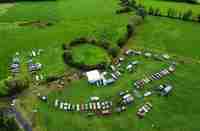July being both world’s hottest and Ireland’s wettest month shows need for urgent climate action
Step into any pub, office, or supermarket in the country and you’re bound to find a conversation about the weather underway. It’s the de facto national pastime, the go-to topic when the conversation has nowhere else to go, and it doesn’t quite matter whether it’s gorgeous, miserable, or completely inoffensively mild outside – it’ll come up either way.
Understandably though, it’s the wet weather that ends up getting commented on the most. We’ve got more words for rain than you can shake an umbrella at: it’s lashing, it’s spitting, it’s pelting, it’s pouring (the old man, for his sins, is perpetually snoring).
We would (and probably do) talk about the rain any chance we get, even when it’s barely worth bringing up. But these last few weeks in particular, discussions about the country’s rain have felt particularly warranted.
As we move into August, we are being greeted with headline after headline about how last month was Ireland’s wettest July on record. I’m sure few are surprised by this; it would’ve been legitimately difficult not to take notice of the seemingly endless curtains of rain descending day in, day out, in recent weeks. But nevertheless, the exact measure of July’s rain still feels staggering. Expected rainfall for the month was exceeded by a massive overshot – 215% to be exact – with the country receiving an average 178.9mm of rain over the few weeks in question.
An aspect of this piece of news that feels especially novel is that directly preceding our wettest month on record, was our hottest one: Ireland experienced average temperatures of 16°C in June of this year, breaking the previous 83-year record by over half a degree.
With multiple examples of unprecedented weather trends occurring in such rapid succession, we can deduce at least two things with absolute certainty. Firstly, that ‘small talkers’ across the country will be at no loss for chitchat material. And secondly, on a much grimmer note, that the climate crisis has arrived to Ireland.
Well, in truth, it’s a bit disingenuous of me to say the climate crisis has “arrived”, as if it’s only come into reality over the last few weeks along with this June’s heat and this July’s rain. The climate crisis is neither something we haven’t seen coming, nor something we could not have argued was already generally in effect before this; after all, we’ve been hearing about rising sea levels and global temperatures for literally decades by this point.
What I mean more so is that despite the theoretical awareness of the changing climate we’ve held for the last number of years, the past few months especially has been one of the first periods during which abnormal weather due to climate change has been so unavoidably notable here in Ireland. Until recently, our cognisance of the crisis came from hearing about it in the media, not from seeing it through the window.
But the same isn’t true everywhere else. Our considerably mild climate has shielded us from the extreme weather events other nations have been experiencing with increasing regularity and severity for years; deadly floods in parts of Europe, extreme temperatures in countries closer to the Equator, hurricanes in the US, record-breaking floods in Asia, etc.
This is what I mean when I say that, comparatively, the climate crisis has only really begun to arrive in Ireland, at least in a way that affects daily life – and even as it has, we have luckily not been met with weather events as extreme as those happening in other countries.
For example, here at home, we may have been lamenting the wet and decidedly un-summery July during our casual weather discussions, but globally speaking, last month was actually the hottest on record. Countries in other parts of the world experienced searing heatwaves and vicious wildfires, and in addition to the massive environmental and infrastructural damage this led to, the fallout included several deaths and serious injuries.
Climate change is not an equal opportunities crisis. It has, and will, affect some countries more than others. And historically, because of our milder climate and access to resources (like home heating to keep us warm during colder winters, etc.), we’ve been among the less effected.
As such, we have been able to take a largely calm, political, and economical approach to environmental discussions and climate policy, because it has not yet become an emergency for us in the way it has for other countries. We have been able to talk about the changing climate as casually as we talk about the changes in the weather day to day.
This is a huge privilege, of course, and shouldn’t take away from the responsibility we should feel to tackle climate change for the sake of other countries and the planet in general. But it also won’t be true for much longer; we are already seeing landmarks like our hottest and wettest months ever, and without major action being taken, the climate crisis will continue to affect us in an increasingly extreme way as we continue forward. And it will do so exponentially, at a rate we won’t be able to keep up with resource-wise.
At a recent press conference, UN secretary-general António Guterres commented that the era of global warming has ended, and “the era of global boiling has arrived”. The window we have to limit global temperature rise to the 1.5°C threshold is rapidly closing and failing to do so will result in irreversible and devastating consequences for both human populations and the environment.
Closer to home, the Climate Change Advisory Council recently said Ireland is not on track to honour the climate targets set in the first and second carbon budget periods and that we “must see emissions fall consistently if we are to meet our national and EU legal obligations in full and on time”.
Both globally and nationally, the climate crisis is already beginning to wreak its effects, and both globally and nationally, the opportunity to act is at risk of passing us by. Dramatic, immediate climate action is needed drastically and it is needed now, before our daily weather chats begin to revolve around much more extreme weather than a bit of July rain.






